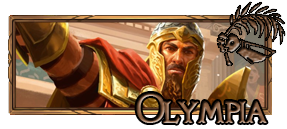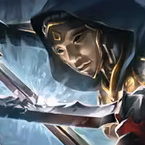Welcome back! This is part 2 of my miniseries on Olympia, Prized Fighter. In part 1, we discussed several strong elements to the hero and overall playstyle; if you haven’t checked out the previous article, you'll find it here.
In the time between penning the first and second parts of this Olympia deep dive, I managed to take Hatchet Dorinthea to a Top 8 finish at Pro Tour: Los Angeles. The original inspiration for Hatchet Dorinthea was actually from my time spent playing Olympia. The build that I am going to present and discuss today is hatchet-based. I think currently it is the strongest version of the deck and the only one that is competitively viable in today's meta.


I am going to provide a “post-Dromai” decklist in today’s article, since she is going to be rotating after week 1 of ProQuest (or maybe even earlier, if she wins The Calling or Battle Hardened in Phuket this weekend). So if you are wondering why we have less poppers and no Cleave, that's why. If Prism becomes a nuisance we can tech for her fairly easily.
Without further ado, here’s the list:

Weapons
- Hatchet of Body (1)
- Hatchet of Mind (1)
- Decimator Great Axe (1)
Equipment
- Grains of Bloodspill (1)
- Nullrune Gloves (1)
- Prized Galea (1)
- Nullrune Boots (1)
- Braveforge Bracers (1)
- Valiant Dynamo (1)
Loadout
- Blade Runner (Blue) (3)
- Cash In (Yellow) (3)
- Blade Runner (Red) (3)
- Blade Runner (Yellow) (2)
- Edge Ahead (Blue) (3)
- Ironsong Response (Blue) (2)
- Fate Foreseen (Red) (3)
- Hit and Run (Blue) (3)
- Money Where Ya Mouth Is (Red) (2)
- Double Down (Red) (3)
- Blade Flurry (Red) (3)
- Hold 'em (Red) (3)
- Hold the Line (Blue) (3)
- Edge Ahead (Red) (3)
- Nourishing Emptiness (Red) (1)
- Sink Below (Red) (3)
- Hold 'em (Blue) (2)
- Take it on the Chin (Red) (2)
- Spill Blood (Red) (3)
- Ironsong Response (Red) (3)
- Up the Ante (Blue) (3)
- Glint the Quicksilver (Blue) (3)
- In the Swing (Red) (2)
- Runner Runner (Red) (3)
- Unmovable (Red) (1)
- Goblet of Bloodrun Wine (Blue) (3)
- Spoils of War (Red) (3)
The deck has several ratios that have been tuned over time. Let’s discuss them in detail first before talking about some strategy and tactics.
8 Non-Attack Action Wager Cards



Wagering: the cornerstone of Olympia.
These form the core of the deck and will allow you to generate a variety of tokens in addition to the gold tokens that Olympia’s hero ability generates. You can pair them with attack reactions to increase the chance that the attack goes through. Keep in mind that you don’t need to do that, since sometimes your opponent will want to keep their hand, or they are afraid they cannot block it out because they don’t have a defense reaction.
In general, you will wager your second attack to withhold info from them and gain as much info as possible as to your opponent’s intentions on offense. You can wager the first attack if you have Blade Flurry - or you have a sharp opponent who will think you have Blade Flurry.
8 0-Cost Attack Reaction Cards



Win wagers, win games.
All of these by themselves are strong; in concert together, they provide enough gas to win multiple wagers and close out games. These are the cards that I want in my arsenal, because they unlock all of the wager cards and Olympia’s hero ability. They are all 0-cost so that they provide maximum threat and have synergy with Grains of Bloodspill and Braveforge Bracers (since dropping to 0 resources doesn’t tell them anything).
6 "Payoff" Cards


Hard work, rewarded.
Both of these cards give great value, but don’t be afraid to just crack copper/gold tokens to dig further into the deck or to fix a hand that is almost there. Double Down is much better mid-game, once you have a gold token and you pick up on your opponent's defensive tendencies.
12 Defensive Cards



Welcome to defensive value town.
Sink Below, Fate Foreseen, and Take It on the Chin provide extra value over the course of the game and can open up a slow life gap. Hold the Line and Unmovable are silver bullet cards that are amazing in the right spots. I think Olympia has a fairly strong matchup into Kayo, but Hold the Line pushes it even more.
Having this density of defensive cards allows you to have a defense reaction on most turns, and if you set one into the arsenal you basically can have something to deal with tricky opponents every turn of the game.
25 Blue Pitch Cards
This ratio of blues allows for smooth turn-to-turn operations. Additionally, this provides a decent chance to draw a blue if you want to turn your gold into half an Energy Potion. It is also the minimum for a good fat deck Decimator Great Axe strategy - you can use that weapon in matches where you are trying to fatigue (Uzuri/Riptide/Arakni).
Arena Tactics

If you find Nourishing Emptiness early, you can set it in the arsenal and wait for Money Where Ya Mouth Is - it's really hard for most decks to stop, and is playable off a single blue.

Double Down into Prized Galea adds 3 damage at reaction speed. Double Down’s effect applies to the whole turn, so if they don’t have a d-react, they cannot defend the attack pattern properly.


Any time you have two vigor tokens + agility, you will be able to block with your entire hand and return 6 value on the following turn (5 offensive value, 1 defensive value). Very few decks can compete with these numbers in the long run. This is also why we are fine without an arsenal, since we can block with 3 cards, swing back for 6 value, and set the most valuable card into the arsenal.


Spill Blood works well with your wager cards, but needs some setup because it will require 4 resources. Creating and cycling vigor and agility tokens is important. Set yourself up for future success by using Grains of Bloodspill and be ready to capitalize when you draw a good hand. If you have the choice of activating Grains or Bracers, you should be making Vigor tokens (except in the late game).

Up the Ante - Olympia’s signature specialization card - is nuts, great on turn 0 as well as a closer. You can combine it with Prized Galea too, if needed, for an extra point of damage. This comes up more than you think, because if you play Up the Ante on a wagered card, it's +4; cracking Galea before playing Up the Ante brings it to +5, which means standard 0 for 4 d-reacts won’t save them. You can also end the game in the second cycle with gold tokens and this card fairly easily, if you need to pitch stack a win. A single vigor also will suffice with a blue and Up the Ante.
Thinking Strategically with Olympia
You want the game to go long enough, but not too long. The sweet spot for Olympia is around 12 to 15 turns. You want to play out all of your reds, and not run into your blue-saturated pitch stack. Playing the first few turns slower also allows you to get a feel for how your opponent likes to play; this is very similar to the other warriors, especially Dawnblade Dorinthea!
Use your gold - you aren't a dragon, you don’t need to hoard it. Pay for Cash In with copper, and save gold for cracking or Double Down. Balance of Justice is annoying, but don’t play around it - if you draw Cash In, play it if you can.
Olympia is a hero that plays on both sides of the field, offense and defense. One of the best ways to improve with Olympia is understanding what the other heroes are trying to accomplish and which cards they play. This is extremely important for decks with a wide attack pattern and disruption, such as Katsu and Kayo. This will make you a better player overall, not just when playing Olympia; nothing can replace experience.

I hope you enjoyed this article series on Olympia and are inspired to try him out. With Dromai rotating and a little help from Part of the Mistveil, Olympia is poised to take down some unprepared opponents in the arena!




